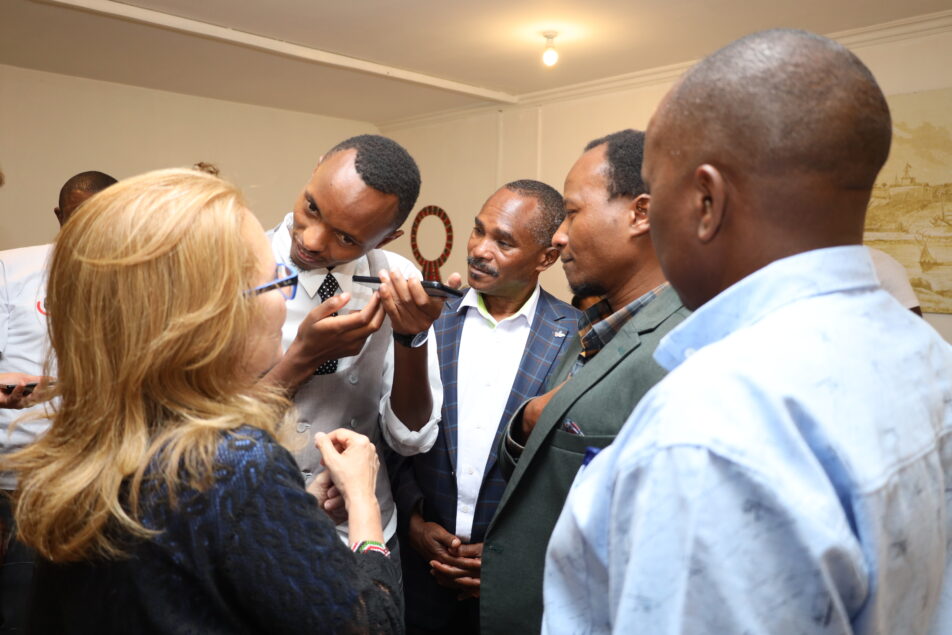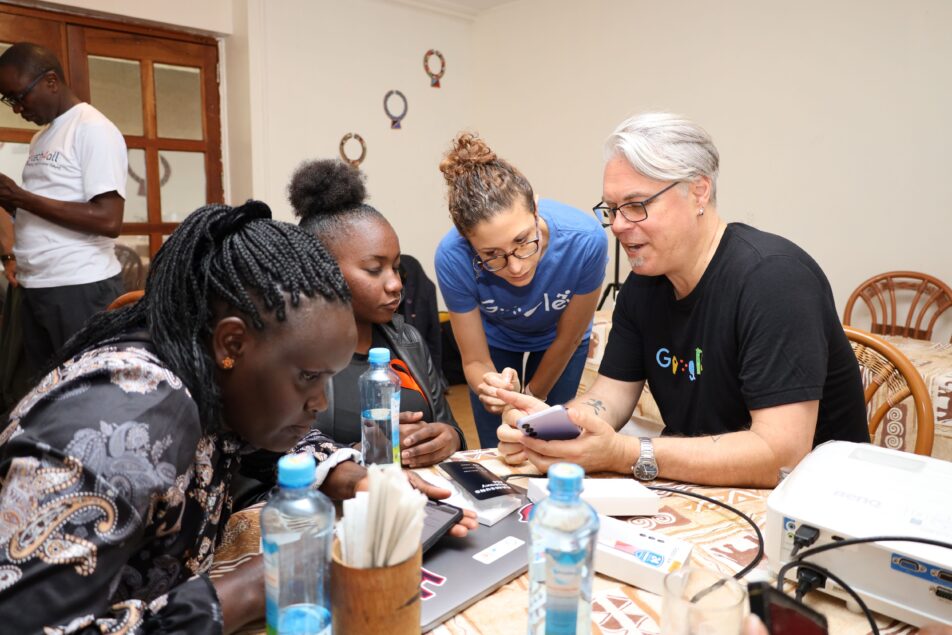Assistive technology in your pocket: the transformative potential of smartphones

How can smartphones and digital assistive technology positively change the lives of persons with disabilities in low- and middle-income countries? How do people with visual or communication impairments in low- and middle-income countries want to use electronic devices in their everyday lives? And what are the real-world implications of this technology to people in terms of cost, use, and effectiveness, particularly in settings with low data and bandwidths?
These are just some of the research questions being explored in an exciting study taking place in Kenya, India and Brazil. Global Disability Innovation Hub (GDI Hub), ATscale and Google are collaborating on a two-year research project to gather evidence to support work to make smartphones more accessible, useful and empowering to persons with disabilities. The project is funded by UK Aid's AT2030 programme to test ‘what works’ to improve access to life-changing assistive technology for all. Launched at Inclusive Africa Conference 2023, which explored taking digital accessibility and assistive technology in Africa to the next level, the project will be crucial in finding evidence to improve people’s access to digital assistive technologies across low- and middle-income countries.
Transforming lives through assistive technology
Smartphones with Internet connectivity can transform the lives of persons with disabilities. When people have access to mobile phones, they have assistive technology in their pockets and digital solutions at their fingertips. Smartphone applications have proven to be hugely beneficial to children and adults with visual, hearing or communication impairments who need assistive technology to access information and communicate.
“We know that mobiles act as both enablers to using digital assistive technologies, and assistive technologies themselves. Mobile ownership and digital skills can be transformative for both the individual themselves and their ability to access services, education, employment and social activities. The potential is huge,” said Professor Cathy Holloway, Global Disability Innovation Hub.

Most persons with disabilities do not get the access they need or the training in digital skills to be able to maximize their phone use, especially in low-and middle-income countries. GDI Hub, ATscale and Google want to change this so that more people can live more productive and independent lives than before. For this, evidence is needed about the ways in which smartphones are both an enabler in people’s lives, and a piece of assistive technology with the potential to replace older forms of stand-alone assistive technology, as well as how they complement mainstream technology.
Mobile phones can be versatile and powerful for persons with disabilities. A phone can have built-in features such as reminders for people with memory loss, or it can have external applications designed for people with specific impairments. For example, a person with a visual impairment can use an application such as BlindSquare to receive relevant information about their surroundings in order to locate shops or other places of interest. Other applications can understand slurred speech and translate to text, while read-aloud software can make websites accessible. Mobile phones can also open up new avenues of livelihood possibilities, by enabling people to work, trade, or engage in digital marketplaces. Mobile phones can be seen as bespoke and cost-effective assistive technology, which can gather multiple tools in a single device.
“Many persons with disabilities in low- and middle-income countries who could benefit hugely from mobile phones simply do not own them, could not afford them, and do not know how to use the digitally accessible applications that could transform their lives. With this project, we hope that more people can get the assistive technologies they need to live healthier, more productive, independent, and more dignified lives than before and to participate in education, the labour market, and their communities,” said Pascal Bijleveld, CEO ATscale.
Mobile-phone based assistive technology is an emerging market, and increasingly governments and telecommunications companies are joining forces to increase access for persons with disabilities. Using evidence to support the development of this market, including supporting persons with disabilities to access and use the technology, is crucial.
"Assistive technology can play a pivotal role in ensuring that persons with disabilities thrive by creating access to information, education, and employment opportunities that might otherwise be out of reach. It's important that we help to maximise the access to this vital technology - particularly in emerging economies where we believe they're set to have a significant impact on people's lives - and we are excited to support this project, in collaboration with GDI Hub and ATscale, that is working to help make that happen,"said Chris Patnoe, Google.
The project aims to clearly demonstrate the benefits of smartphones and articulate what they can empower persons with disabilities to achieve. The study will also explore what it will take to make smartphones more accessible, affordable and effective to meet the needs of persons with disabilities, including accessing and using accessibility features already built into smartphones within the context of low and middle-income countries. For example, the Talkback (android) or Voice Over (Apple) features read aloud an icon or application’s name when touched with fingertips. Through the research process, the project will also develop training to support persons with disabilities to access phones, and then to unlock the potential of that phone to help meet their needs.
“Funded by UK aid, the AT2030 programme is designed to test ‘What Works’ to improve access to life-changing assistive technology for all. Mobiles have the ability to change lives. The more we can understand about the importance and potential of this technology, the more we can put AT in the hands of the people that need it most,” said Professor Cathy Holloway, Global Disability Innovation Hub.
About GDI Hub
Global Disability Innovation Hub (GDI Hub) is a research and practice centre driving disability innovation for a fairer world. Operational in 41 countries, with more than 70 partners, we've reached 29 million people since launching in 2016.
About ATscale
ATscale, the Global Partnership for Assistive Technology (AT), is a cross-sector global partnership with a mission to transform people’s lives through AT. It catalyzes action to ensure that, by 2030, an additional 500 million people in low- and middle-income countries get the life-changing AT they need.
About Google
Google’s mission is to organise the world’s information and make it universally accessible and useful. Through products and platforms like Search, Maps, Gmail, Android, Google Play, Chrome and YouTube, Google plays a meaningful role in the daily lives of billions of people and has become one of the most widely-known companies in the world. Google is a subsidiary of Alphabet Inc.